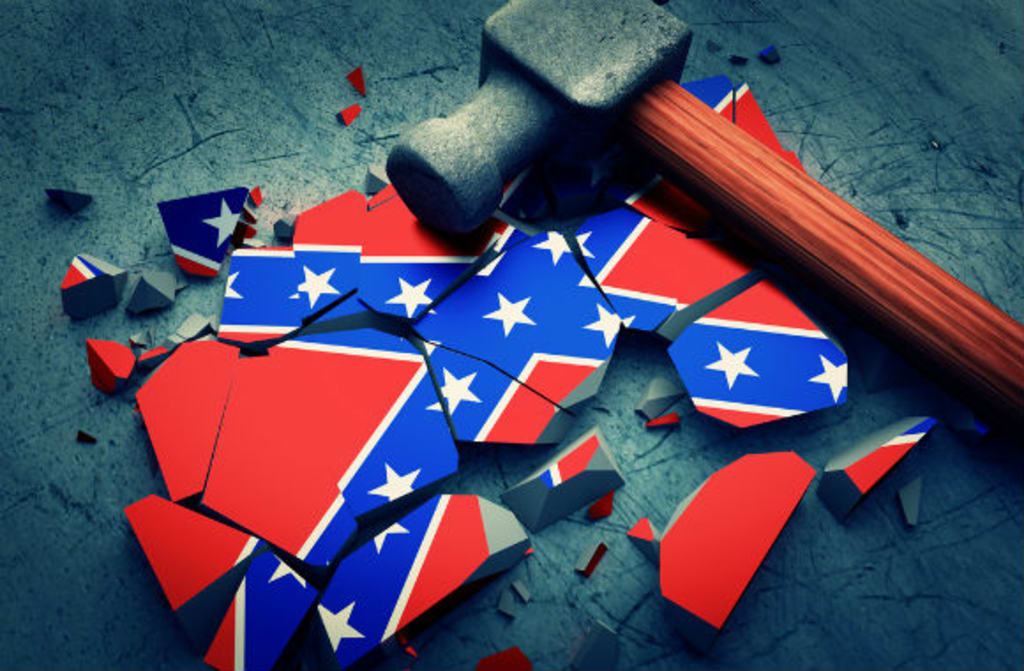The Legacy of the Confederacy Part I
“Why Was There a Civil War?” (Hint: It Was White Supremacy)

One of the questions immigrants must answer correctly when taking the test to become a U.S. citizen is “What was the Civil War fought over?” There are three “acceptable” answers:
- Slavery
- States' Rights
- Economic Reasons
Of course, those “states rights” included the right of white individuals to own black individuals, and those “economic reasons” were based on a slave-labor market. Ironically, even with the broad answer choices, our President would still fail the citizenship test.
However, when President Trump said in a recent interview that many Americans don’t know what the Civil War was fought over, he was correct. Although Confederate monuments and flags are finally being removed from public lands, many white Americans still revere these symbols without a clear consensus on what the Confederate States of America, or CSA, actually stood for.
According to a 2015 poll that asked respondents "Do you think schools should teach that slavery was the main reason for the Civil War?” 55 percent of Americans said yes, 37 disagreed and the rest had no opinion. The wording of this question is problematic in itself because the slaves didn’t start the war; the slave-owners did. Nonetheless, it illustrates how bad Americans are at talking about our history.
When I was a junior in high school, my honors-level U.S. history teacher proclaimed that “slavery was a necessary evil” because it supported the economy of the south. I remember feeling really uncomfortable for the lone black student who sat in front of me. Oddly enough, this same teacher had a poster on his wall with JFK’s famous quote delivered in front of the Berlin Wall: “When one man is enslaved, all are not free.” Is it any wonder that people are confused?
Fortunately, I discovered a book called Lies My Teacher Told Me” by James W. Loewen, which I recommend to everyone. The author critiques history as taught by US public schools, and it dispels many myths that I was taught about the likes of Abraham Lincoln and John Brown. In the chapter on the Civil War and Reconstruction, he points out that although the white men who fought for the Confederacy had different personal motivations, they were all ultimately fighting to defend an economy based on the enslavement of black human beings. Even though the Confederates truly believed (as some of their ancestors still do today) that they were fighting for abstract concepts like “states rights,” or even just for their own personal economic interests, they did so at the behest of wealthy slave owners.
That’s when I began to understand the underlying cause of the Civil War wasn’t slavery; it was white supremacy. It was the idea that white states' rights matter more than black human rights; that white economic interests matter more than black economic interests; that white lives matter more than black lives. Sadly, this ideology persists.
Yes, there were some white male slaves in America, but they were enslaved as punishment for a crime, or they willing signed away their freedom to become indentured servants. They were not auctioned off like cattle, and their families were not forcefully separated like the African American slaves. Black people were seen as slaves as soon as they were born. Even the white people who didn’t own slaves benefited from the slave economy since they enjoyed the low prices of goods produced by black slave labor. This form of chattel slavery was built on an assumption of white supremacy, and even if the Confederates didn’t think of themselves as racists, they were fighting for the rights of white people to oppress black people. And no matter how slaves were treated, slavery was and is still morally wrong.
The best example of this phenomenon was the leader of the Confederate army, Robert E. Lee. President Lincoln wanted Lee, who had served in the US military for years, to fight for the Union. In a letter to his son leading up to the war, General Lee wrote:
“The South, in my opinion, has been aggrieved by the acts of the North... But I can anticipate no greater calamity for the country than a dissolution of the Union.”
However, Lee’s tune changed when his home state of Virginia chose to join the CSA, so he felt obligated to become a Confederate. For Lee, the war suddenly became personal, and he saw himself as defending his “homeland;” nonetheless, the white leaders of his homeland had just voted to join the CSA for the purpose of keeping slavery legal. Not only did his loyalty to his home state override his loyalty to the US Constitution; it also overrode the basic humanity of all the black people trapped inside Virginia.
Of course, CSA apologists say that Lee was a “product of his time,” which is true, but that doesn’t mean he wasn’t racist. As alt-righters and American neo-Nazi’s like to accurately point out, the US Constitution was written by white men, for white men. Many (if not all) of the founding fathers did not see black people or women as “Endowed by their Creator with certain unalienable Rights.” We mustn’t avoid this ugly truth. Instead, we should criticize the founders for their faults. After all, they were humans, just like the black people they held as slaves.
Likewise, we need to criticize the ideology of the CSA. I don’t think we should outlaw the Confederate flag in the same way that Germany has outlawed symbols of Nazism, but I think Americans living today, especially the white ones, should denounce the CSA and white supremacy. Black lives mattered then and now.
I’m sure Robert E. Lee and his men were “good guys” who wanted to “defend their way of life,” but their way of life was dependent on the enslavement of black people. That doesn’t mean we should erase them from history, but we should be able to say that they were on the wrong side of the Civil War.
Can we honor those who died—the victims of the Civil War—without glorifying the CSA or white supremacy? My next essay will discuss Confederate monuments in an attempt to answer that question.
Sources
Trump quotes about Andrew Jackson and the Civil War
Poll: Americans divided over whether slavery was the Civil War’s main cause
About the Creator
Robert Wells
Robert Wells is a freelance writer from North Carolina. His specialties include history, film and video games.






Comments
There are no comments for this story
Be the first to respond and start the conversation.